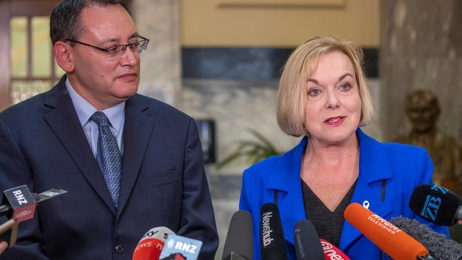
This is a tale of two Kiwi women.
Both are strong matriarchs who would do anything for their families.
Both have selflessly cared for a dying loved one.
Both have lost someone dear to cancer.
Despite their similarities, though, they hold at least one major difference.
When it comes to the End of Life Choice legislation – one is voting no, the other – yes.
Heather Gregory
Heather Gregory was ready for one last night out at a school function before becoming her husband's fulltime carer.
She'd been working as a part-time teacher, but was ready to devote her full attention to Richard.
He was diagnosed with liver cancer in the early 2000s and over the last 12 months his health had gone downhill.
While at the quiz night she had a really horrible feeling. Something was wrong.
She texted her children and before she could put her phone down, it rang.
It was her daughter. Her husband was dead.
-----
"He had 10 good years with diagnosed cancer, with reasonably good health. But then, the tumours in the liver were releasing hormones that damaged his heart." Heather says.
At the end, he was a very sick man – the Coroners' report included a full page of his injuries.
"It was a horrible way to live. He wasn't himself and didn't feel in control." Heather says.
/cloudfront-ap-southeast-2.images.arcpublishing.com/nzme/VYG5AIWWPGMYNYNMAM2K3B2E6A.jpg?width=413&height=551&mode=max)
Heather and Richard Gregory. Photo / Supplied
On the afternoon he chose to end his own life, he was having a doze on the sofa and when he woke up he found that he couldn't push himself upright.
"He felt really trapped in his own body and it gave him a big fright."
"That afternoon we got him out in the garden, in the sun, and he was talking to my youngest about dying."
That evening, three of their five children found their father's body.
Heather got there just before the police arrived.
In a way, she got to be with him in the end – even if it wasn't how she'd imagined.
"Instead of sitting there saying all the things you'd say to your partner of 28 years, the father of your five children, like: 'you're loved, we'll be missing you', I was saying 'you were supposed to wait for me. It wasn't supposed to be like this'."
She describes it as tragic. Unexpected.
"It was a total disaster - and a Bill like this would just stop it."
"Richard could've known that when the time came we could choose the time, place and the people around him. He could've had a peaceful death."
/cloudfront-ap-southeast-2.images.arcpublishing.com/nzme/BGYC6K5REPZMYTBQQSWHPN4PHQ.jpg?width=659&height=494&mode=max)
Heather and Richard Gregory. Photo / Supplied
"He wrote in his note he was frightened. He was frightened by the end and we shouldn't be. Hospice can only take away so much of that fear. But, this Bill can take away a lot more of that fear."
He had thought he was doing the right thing.
"Unfortunately it was the wrong thing," she said, "I still live in the house where he did it, it's constant memories. We had the Coroners, the police involved … If we had the End of Life [Choice] Bill, the whole process could be loving, compassionate. We could have had a great farewell instead of guilt, doubt and all the other mess that's left behind.
"He had to do what he had to do while he could still do it. That's why he took the opportunity - he knew I wasn't going to be leaving his side."
She doesn't wish it upon any other family.
"I'd feel very guilty if I sat back and didn't do my utmost to get his story out there so people could see that some people need this."
Heather Mason
Heather Mason's son, Braden, was 6-and-a-half when their lives were turned upside down.
He woke up one morning wobbly on his feet and kept saying: "I can't walk, Mum".
It was then when Braden was diagnosed with a rare form of cancer called ependymoma.
A team of doctors gave him less than six months to live.
But, 15 years later, Braden had done all the things he wanted to do.
Although the tumours on his spine left him paraplegic - he swam, jet skied, rode a quad bike and even drifted a race car before dying aged 21 in March this year.
"He chose life every time, even though life was so hard for him." Heather says.
-----
"Every time we would go to hospital Braden would say 'I don't wanna die Mum, I don't wanna die'," Heather remembers.
The long days of hospital visits were met with equally long nights singing by Braden's bedside to ease his anxiety as he struggled to get to sleep.
"He was such a courageous young man. He didn't let anything get in his way."
The doctors were so blown away they eventually gave up saying how much life he had left to live.
/cloudfront-ap-southeast-2.images.arcpublishing.com/nzme/JWJRBMU6GULADF75YUVRD3NJTA.jpg?width=424&height=318&mode=max)
Heather and Braden Mason. Photo / Supplied
"He kept on defying all odds." Heather says.
In 2014, the family visited Christchurch Hospital and asked a specialist for another drug to help with Braden's anxiety.
"It was through the roof - no one knew how to cope with it. He had so many other complex issues going on that when they gave him a drug ... he went into a coma for 24 hours."
"They said 'I'm sorry, but it's time for you to say goodbye to Braden.' And again, against all odds, Braden came back to us," she says.
But, Heather admits, life was not easy.
"Yes, he openly admitted life was hard. But he wouldn't have chosen euthanasia. We talked about it and he said 'I could never go that way'."
/cloudfront-ap-southeast-2.images.arcpublishing.com/nzme/UM5UW5O6KQ4DY26AASH3ISYFGU.jpg?width=562&height=422&mode=max)
Braden Mason. Photo / Supplied
She remembers one night Braden said to her and his father Ray that he felt like he was a burden.
"We both burst into tears and explained to him quite sternly, 'don't you ever think that, son'. We said, 'you are precious and it's a privilege to look after you. We love you'.
"I think when loved ones say that, they need reassurance that they are not a burden. That's one of the things I worry about in this Bill - is people thinking their families would be better off without them. No human being should feel that way."
In March this year, Braden died at home peacefully. He had the ones who loved him by his side.
"I just held him and spent those last moments with him."
Heather's aware Braden is the exception, not the rule.
"His doctor said at his funeral 'I don't think I'll ever come across another case like Braden's in my lifetime'."
But, she says, there could be more exceptions out there.
"Things can be made comfortable for people. A lot of people might argue with that, and that's okay too."
The referendum
In this year's general election Kiwis can vote in a referendum on whether you support the End of Life Choice Act 2019.
If passed, only a New Zealand citizen or resident, over the age of 18, who has a terminal illness would be eligible for assisted dying.
Two doctors would need to assess whether death is likely within six months.
If there's a question over mental competency - there'd be a referral to an independent psychiatrist.
If there's a majority "yes" vote, the law would come into force by the end of next year.
Take your Radio, Podcasts and Music with you









